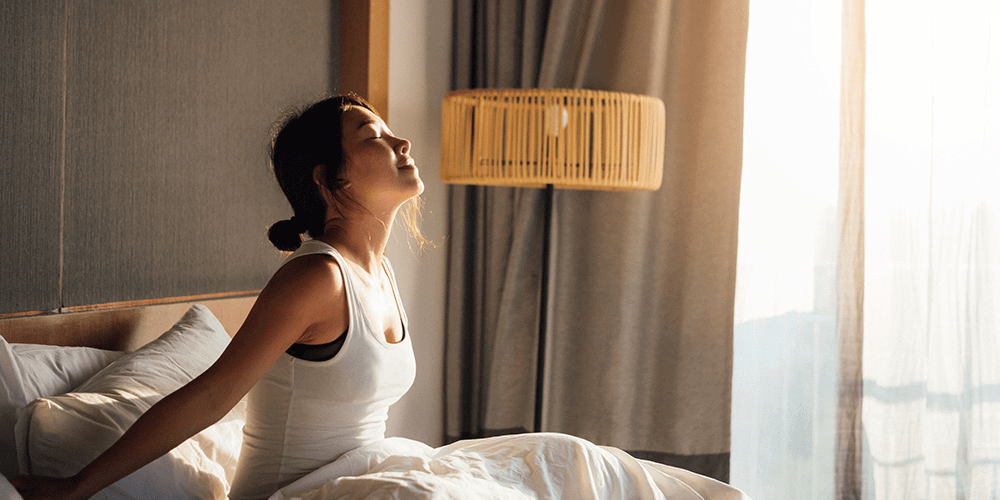A Healthy Night’s Sleep Starts the Moment You Wake Up

Taking small steps in your day goes a long way in helping you improve your sleep at night.
Did you know that a good night’s sleep starts with what you do during the day? In fact, from the moment you wake up, you’re affecting your sleep that night.
The National Sleep Foundation’s 2022 Sleep in America® poll shows that Americans’ daily routines create some less-than-ideal conditions for a good night’s sleep. As it turns out, many Americans can do a better job at the good daytime behaviors that help improve our sleep.
The good news is we all have the potential to improve our sleep—just by taking some small steps during your day. Making changes to your daytime habits not only sets the stage for better sleep but also leads to lower stress levels and better overall health.
Here are four simple changes to your daily routine to help you become your Best Slept Self®:
GET SOME SUN
The right light exposure plays a big part in helping manage your circadian rhythms, the natural process behind staying awake and falling asleep. It’s also a super-influential factor for your overall sleep health.
So, it makes sense that bright, natural light during the day, especially in the morning, helps you feel awake and energized, while dim light in the evening, especially before bed, helps you wind down and fall asleep.
According to the National Sleep Foundation survey, people who spent a moderate amount of time outdoors (3-5 hours per day) reported the highest sleep health.
However, nearly half of Americans say they’re not exposed to bright light indoors in the morning and afternoon.
If you’re not getting much exposure to natural light, step outside for at least an hour each morning or afternoon and see the positive difference a little sunlight can make in your sleep health. Get some bonus sunshine by having your morning coffee outside, or taking your dog for an extra walk (they need vitamin D, too!).
GET UP AND GET MOVING
Making regular exercise part of your daily routine keeps you feeling energized during the day and can reduce daytime sleepiness. While daily physical activity has widespread health benefits and promotes deeper sleep at night, not everyone is getting their sweat on long enough to feel the positive effects.
Many Americans are sedentary for much of the day—with more than a third falling short of CDC recommendations for 2.5 hours of moderate or vigorous activity each week, like brisk walking, jogging, or running.
If you’re parked behind a desk most of the day, even some light physical activity can go a long way in improving your sleep health. Ride your bike to work if you can, or use your work breaks to take brisk walks outside. Skip the elevator and walk up and down your building’s stairs. Consider getting up a little earlier and make a 30-minute workout part of your pre-work routine. Regular exercise, even a little here and there, can help you fall asleep faster. This can result in a deeper, more satisfying night of sleep.
MEALTIME CONSISTENCY IS KEY
Eating your meals at a consistent time each day creates another important element of your daily routine that positively affects your sleep cycle.
While routinely eating meals on a regular schedule contributes to better quality sleep, 4 in 10 Americans polled say that their meals aren’t part of a regular, daily routine. Irregular mealtimes or skipped meals can negatively affect your ability to maintain sleep and wake schedules, especially if meals are eaten too close to bedtime.
Plan on eating meals at the same time every day and be sure to have your last meal at least 2-3 hours before bedtime to allow your food to fully digest before you turn in for the night. We’ve all experienced that haunting restlessness that can come from hitting the pillow soon after a meal.
CUT BACK ON CAFFEINE—OR SKIP IT ALTOGETHER
The less caffeinated you are during the day, the more likely you’ll sleep well at night.
Grabbing a cup of coffee might seem like an easy fix after a night of tossing and turning, but the caffeine you’re drinking to perk up may be winding down your sleep time.
